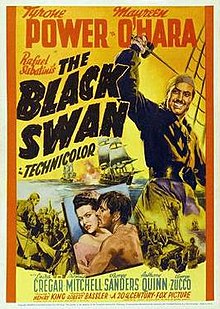The Black Swan (film)
| The Black Swan | |
|---|---|

Theatrical release poster
|
|
| Directed by | Henry King |
| Produced by | Robert Bassler |
| Screenplay by |
Ben Hecht Seton I. Miller |
| Based on |
The Black Swan by Rafael Sabatini |
| Starring |
Tyrone Power Maureen O'Hara |
| Music by | Alfred Newman |
| Cinematography | Leon Shamroy |
| Edited by | Barbara McLean |
| Distributed by | Twentieth Century-Fox Film Corporation |
|
Release date
|
|
|
Running time
|
85 minutes |
| Country | United States |
| Language | English |
| Box office | $3 million (US rentals) |
The Black Swan is a 1942 American swashbuckler Technicolor film by Henry King, based on a novel by Rafael Sabatini, and starring Tyrone Power and Maureen O'Hara. It was nominated for two Academy Awards, and won one for Best Cinematography, Color.
This was the final film of silent star Helene Costello.
After England and Spain make peace, notorious pirate Henry Morgan (Laird Cregar) decides to reform. As a reward, he is made Governor of Jamaica, with a mandate to rid the Caribbean of his former comrades, by persuasion or force if necessary. He replaces the former governor, Lord Denby (George Zucco), but is not trusted by either the lawful residents or the pirates.
Captain Jamie Waring (Tyrone Power) and his lieutenant, Tom Blue (Thomas Mitchell), reluctantly give up their "trade" out of friendship for Morgan, but others of the Pirate Brotherhood, such as Captain Billy Leech (George Sanders) and Wogan (Anthony Quinn), refuse to change. Meanwhile, Waring takes a liking to Denby's daughter, Lady Margaret (Maureen O'Hara), who happens to be inconveniently engaged to an English gentleman, Roger Ingram (Edward Ashley). As it turns out, her fiancé is secretly providing information about ship sailings to the unrepentant pirates.
When Morgan is unable to stop the depredations of his old shipmates, he is suspected of still being allied with them. It is up to Waring to set sail to get to the bottom of things (kidnapping Lady Margaret in the process so she won't be able to marry Ingram).
...
Wikipedia
